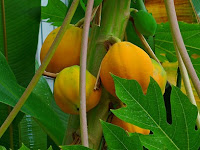Some spurious reports indicate that the leafs or seeds of the papaya (Carica papaya) may exhibit potential activity against dengue. Researchers[1] wanted to test this theory and prepared an extract of papaya leaves in water. This aqueous extract was administered in a dose of 25 ml twice daily for five consecutive days to a patient who was infected with dengue fever.
The blood reports (platelets count, white blood cells and neutrophils) showed that papaya leaves exhibited potential activity against dengue fever. The researchers suggest that different parts of the papaya may used as a strong natural candidate against viral diseases.
 |
| [Foto: H. Zell] |
This all suggests that in the near future, possible new active ingredients against dengue could be harvested from leaves and seeds of the papaya plant.
[1] Ahmad et al: Dengue fever treatment with Carica papaya leaves extracts in Asian Pacific Journal of Tropical Biomedicine - 2011
[2]Nunes et al: The component of Carica papaya seed toxic to A. aegypti and the identification of tegupain, the enzyme that generates it in Chemosphere - 2013

No comments:
Post a Comment